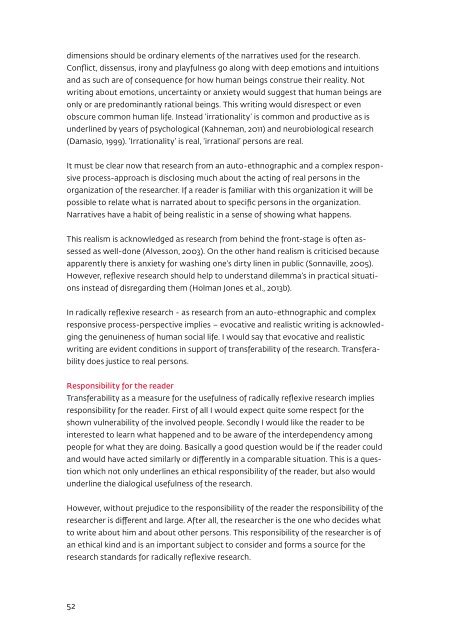Rumbling on performativity_Frits Simon
Rumbling on performativity_Frits Simon
Rumbling on performativity_Frits Simon
Create successful ePaper yourself
Turn your PDF publications into a flip-book with our unique Google optimized e-Paper software.
dimensi<strong>on</strong>s should be ordinary elements of the narratives used for the research.<br />
C<strong>on</strong>flict, dissensus, ir<strong>on</strong>y and playfulness go al<strong>on</strong>g with deep emoti<strong>on</strong>s and intuiti<strong>on</strong>s<br />
and as such are of c<strong>on</strong>sequence for how human beings c<strong>on</strong>strue their reality. Not<br />
writing about emoti<strong>on</strong>s, uncertainty or anxiety would suggest that human beings are<br />
<strong>on</strong>ly or are predominantly rati<strong>on</strong>al beings. This writing would disrespect or even<br />
obscure comm<strong>on</strong> human life. Instead ‘irrati<strong>on</strong>ality’ is comm<strong>on</strong> and productive as is<br />
underlined by years of psychological (Kahneman, 2011) and neurobiological research<br />
(Damasio, 1999). ‘Irrati<strong>on</strong>ality’ is real, ‘irrati<strong>on</strong>al’ pers<strong>on</strong>s are real.<br />
It must be clear now that research from an auto-ethnographic and a complex resp<strong>on</strong>sive<br />
process-approach is disclosing much about the acting of real pers<strong>on</strong>s in the<br />
organizati<strong>on</strong> of the researcher. If a reader is familiar with this organizati<strong>on</strong> it will be<br />
possible to relate what is narrated about to specific pers<strong>on</strong>s in the organizati<strong>on</strong>.<br />
Narratives have a habit of being realistic in a sense of showing what happens.<br />
This realism is acknowledged as research from behind the fr<strong>on</strong>t-stage is often assessed<br />
as well-d<strong>on</strong>e (Alvess<strong>on</strong>, 2003). On the other hand realism is criticised because<br />
apparently there is anxiety for washing <strong>on</strong>e’s dirty linen in public (S<strong>on</strong>naville, 2005).<br />
However, reflexive research should help to understand dilemma’s in practical situati<strong>on</strong>s<br />
instead of disregarding them (Holman J<strong>on</strong>es et al., 2013b).<br />
In radically reflexive research - as research from an auto-ethnographic and complex<br />
resp<strong>on</strong>sive process-perspective implies – evocative and realistic writing is acknowledging<br />
the genuineness of human social life. I would say that evocative and realistic<br />
writing are evident c<strong>on</strong>diti<strong>on</strong>s in support of transferability of the research. Transferability<br />
does justice to real pers<strong>on</strong>s.<br />
Resp<strong>on</strong>sibility for the reader<br />
Transferability as a measure for the usefulness of radically reflexive research implies<br />
resp<strong>on</strong>sibility for the reader. First of all I would expect quite some respect for the<br />
shown vulnerability of the involved people. Sec<strong>on</strong>dly I would like the reader to be<br />
interested to learn what happened and to be aware of the interdependency am<strong>on</strong>g<br />
people for what they are doing. Basically a good questi<strong>on</strong> would be if the reader could<br />
and would have acted similarly or differently in a comparable situati<strong>on</strong>. This is a questi<strong>on</strong><br />
which not <strong>on</strong>ly underlines an ethical resp<strong>on</strong>sibility of the reader, but also would<br />
underline the dialogical usefulness of the research.<br />
However, without prejudice to the resp<strong>on</strong>sibility of the reader the resp<strong>on</strong>sibility of the<br />
researcher is different and large. After all, the researcher is the <strong>on</strong>e who decides what<br />
to write about him and about other pers<strong>on</strong>s. This resp<strong>on</strong>sibility of the researcher is of<br />
an ethical kind and is an important subject to c<strong>on</strong>sider and forms a source for the<br />
research standards for radically reflexive research.<br />
52



